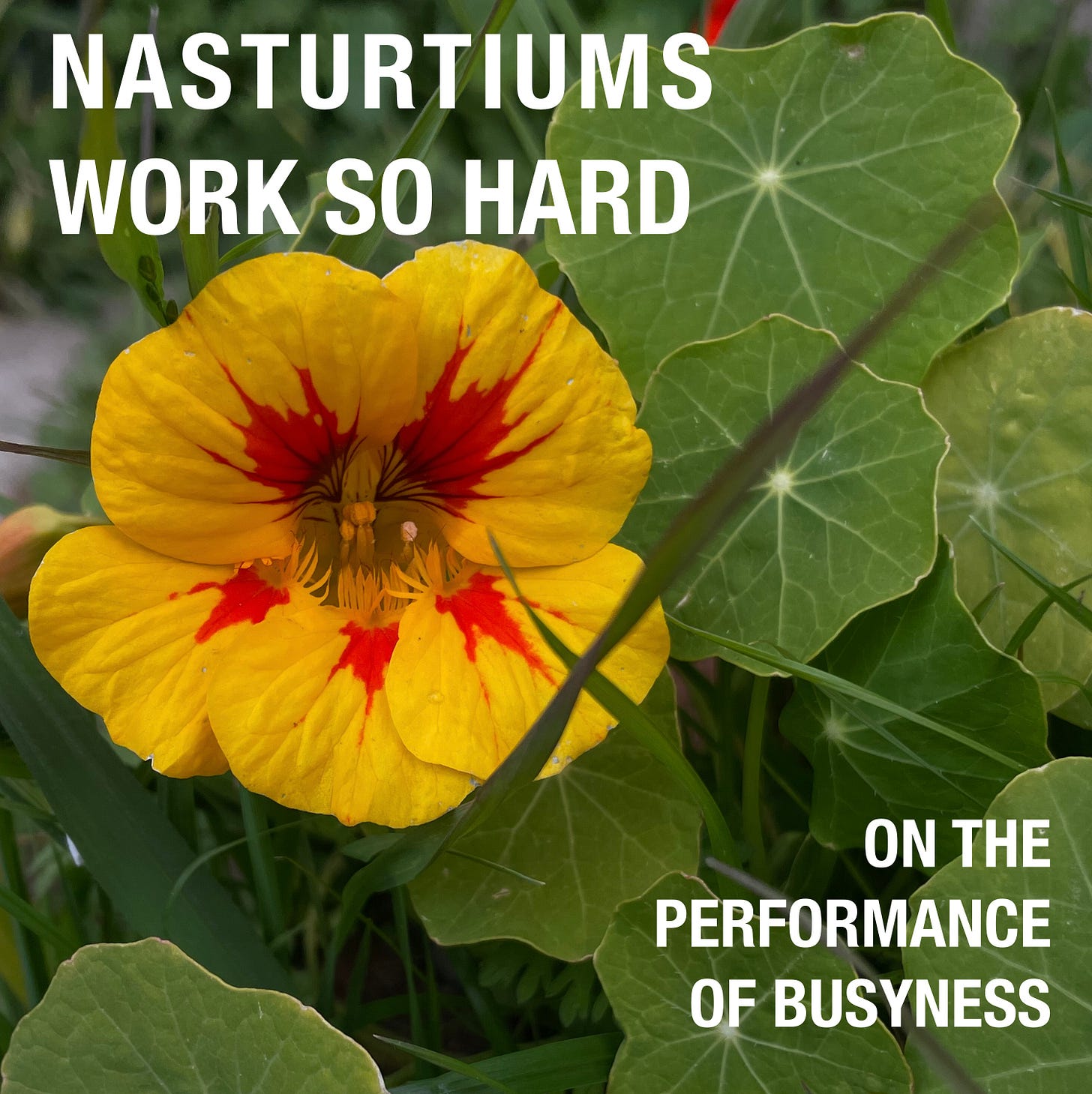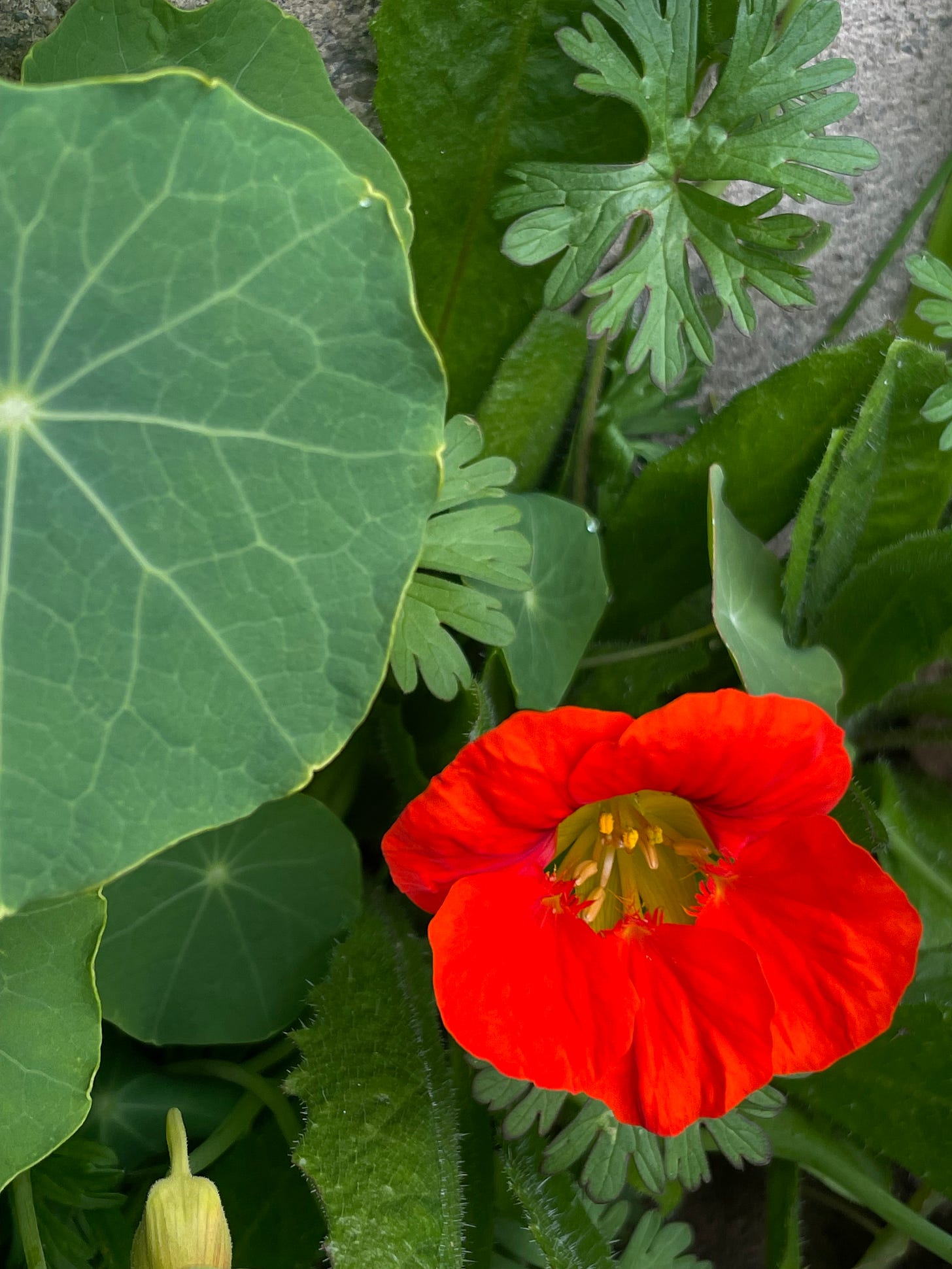Outside the studio where I write, there are three or so young nasturtium flowers, spurred on to growth from the incessant rains, and likely to last, as all nasturtiums do, until the first big cold snap of the year. I’ve kind of become obsessed with them, their oranges are so vibrant, so surreally bright. Their oranges and yellows seemingly pop out of green nowhere. And then they’re here, vibrant and beautiful. If flowers were to speak and say they were alive, the first would be a nasturtium.
Nasturtiums are annuals, which, if you don’t know, means they grow from seed in the spring, bloom, then keep on trucking until the seasons change and they die, leaving their seeds where they lay. This life is quick and to the point. Once the soil is warm enough, they begin to germinate, their little proteins and bits of energy shooting to the top of the soil, beginning their life which they will quickly end. And this is true, on many timescales for many plants. They wake up, grow into existence, then eventually die. Many plants, even nasturtiums, don’t really stop growing or seeking out light in the sky or water below. They are workaholics, constantly busy, exerting so much effort to stay alive, to thwart herbivores while enticing others. Yet all I see is a beautiful flower, moving to a light breeze at night. They’re almost pretending they do nothing.
And here in our human world, in the United States specifically, we cannot stop trying to look busy. It’s our own performance, our putting on of bright colors like a nasturtium. To talk and act as though we just don’t have time to hang out because there is just too much going on—that’s the performance.
I know many people who don’t like to talk about the projects they work on for fear of how it might affect the end result. However, these same people, talking to me with a glass of wine, coffee, or smoking a joint, also can’t stop complaining that they are so busy. And often times, that person is me as well.
This is not at all a new or hot take. Silvia Bellezza, a Columbia Marketing professor, found in a 2017 study that to say you’re busy, whether it is true or not, is essentially the new Rolex of our time, the new status symbol. As our labor has become, at least partially, more focused on intellectual tasks rather than physical labor, and luxury goods in general have become more accessible, to say your busy is to lay claim to how much value you have to your business and those that surround you. Essentially, you are stating your economic value to the American system of capitalism. Or, as Bellezza put it in an interview, “It’s just that, compared to farming and manufacturing, there’s now a more competitive market for talent and human capital, such that the more you work, it must mean that you’re very sought after in the market.”
This sort of relates to what Derek Thompson called in the Atlantic the new faith of Workism. For Thompson, our obsession with work and the burnout that inevitably proceeds it is part of showing our devotion to the faith of work and capital. To be busy then is to not only show how much you are needed, but how much you are devoted to the systems to which we live within. It’s almost as if the Protestant work ethic has become reversed into a new form of secular faith.
This is not at all to say that everyone who is busy is just performing. There are many people out there who need to work a lot in order to pay the bills, to sustain their lives in this highly unequal world we live in. This, to me, is a true kind of busyness, however unhealthy and systemically problematic it is. Yet, as Bellezza discovered in her research, those with more blue collar jobs find themselves seen as lower status, even if they are working more and potentially making more money than say, a project manager at a tech company.
I have friends who are truly busy in order to pay their bills or busy for the love of the work they do, but usually they are so busy they can’t even take the time to say so. I’m not necessarily talking about people such as them, but rather those that use it as performance without recognizing it as such. I see this busy-gloating all the time, from friends of mine who are bosses, saying how they have such little free time as we split a bottle of wine. I listen to friends complain about their workloads as we go for a walk. I even see it in myself, listing future events, plans, and projects.
This busyness idea is really just a cultural performance, and one that at the end of it all cultivates a highly problematic growth mindset that inherently neglects all aspects of our world beside the human. With this thinking it’s so easy to forget that, living in a highly industrialized nation such as the US, fracking and a plethora of other human activities are polluting our rivers and damaging our world for future generations of all species, just so we can claim that we made a bunch of money in our lifetime—and were sooo busy and stressed while doing it. This isn’t even to mention the amount of physical damage actual busyness creates on the body.
This whole notion of busyness is absolutely stupid. We are not nasturtiums, or plants of any kind. We must work to live our lives in this society, but that does not mean we should work more than necessary. When we do, we make not just our life, but many lives, human and not, more precarious and fragile. I look at the nasturtiums in the backyard, and I don’t see them as busy. I create a story in my head of how simple their lives are, just waiting for sunlight, for a bee or a hummingbird to pollinate them, swaying in the sun. I see in them a dream of peace and quiet, of clam, a world where busyness doesn’t exist, where I and everyone else don’t feel the need to overwork themselves beyond what they need to pay the bills and go on vacation. And I know this is just a story, that the nasturtiums are working perhaps harder than I am. But one thing they do better than me and many, is work only enough to live.







